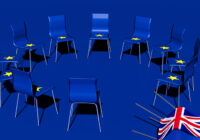When you’re told nobody had any idea, you can only conclude that there were plenty of people who knew what you weren’t supposed to know.
In an interview with British TV presenter Piers Morgan, US President Donald Trump revealed what he learned about Queen Elizabeth’s take on Brexit. It appears that she sees it as “a complex problem.” Emphasizing the deep insight of the queen, Trump followed this revelation with the observation, “I think nobody had any idea how complex that was going to be.”
Here is today’s 3D definition:
Nobody:
In political rhetoric, the fictional person that stands in for everybody, including the speaker, who has been complicit in a major historical mistake
Contextual note
Of course, plenty of people, including those who voted for Brexit, knew that it would be extraordinarily complex. But Trump has a habit of imagining what people didn’t know or understand. Concerning the health care law in the US, he famously said, “Nobody knew it could be so complicated.”
By George W. Bush’s second term in office, between 2005 and 2009, most people in the US came to realize not only that there had been no weapons of mass destruction (WMD) in Iraq to justify the 2003 invasion, but that the consequences of that invasion were catastrophic for the entire region and for global stability in general. The politicians in the US and the UK who blindly supported President Bush and Tony Blair, as well as the mainstream media, when challenged on why they hadn’t seen the mistake, routinely claimed that nobody could have known that there were no WMD or that the effects of an invasion would be so disastrous.
As one servile columnist wrote in 2006: “Who thought Iraq had WMD? Most everybody.” Larry Elder found all the evidence he needed in quotes from establishment Democrats and Republicans, sufficient in his eyes to prove definitively that “most everybody” believed what, by then, were understood to be deliberate lies. Adding “most” in “most everybody” leaves some wiggle room to admit that “everybody” should be taken as hyperbole, but Elder carefully avoids mentioning any of the lucid observers of the time who weren’t taken in by the lies.
Historical note
In particular, Elder avoided mentioning people like Hans Blix, Scott Ritter or Mark Gwozdecky of the International Atomic Energy Agency, who described the mood of the time: “Nobody wanted to challenge the President. Nobody wanted to believe inspections had anything of value to bring to the table. The press bought into that.”
In other words, contrary to popular belief, the “nobody” that Gwozdecky refers to doesn’t indicate people who don’t exist. It serves instead to describe a class of people hypocritically committed to ducking their responsibilities. That class of people began with politicians, but as Gwozdecky points out, it could have gone nowhere without the able assistance of the press.
As in 1898, when William Randolph Hearst told Americans to “remember the Maine,” the corporate media are incapable of stepping in to throw the slightest doubt on the supposed causes of war. War is good for the press and, the politicians believe, it is good for the economy. And they have a point. An economy built around the needs of the military — and potentially feeble without it — needs a war from time to time to keep the engine ticking over. And if the war is in a place where resources to feed the economy (oil, for example) are part of the stakes, it’s a no-brainer.
If politicians and the media have lost all perception of the ambiguity of “nobody,” they need only return to Homer to understand the power of the word that saved Odysseus when he was imprisoned in the cave of the one-eyed Polyphemus, the Cyclops, who announced his intention to eat the Greek hero for dinner.
Wily Odysseus began by offering the Cyclops wine, which he found so pleasing he said to his captive: “Give me more to drink and tell me your name. I’ll return the favor and eat you last.” Odysseus gave him the wine, telling his predatory host his name was “Nobody.” More interested in the wine than in the meal, the Cyclops eventually fell into a drunken slumber, allowing Odysseus and his companions to seize a fiery brand and poke out the single eye of Polyphemus.
The blinded Cyclops began screaming to his countrymen, “Brothers, Nobody tried to kill me!” The others concluded there was no problem and left him to suffer. Odysseus and his companions then managed to escape, hidden beneath the sheep Polyphemus kept in his cave, which he let out for grazing in the morning.
In this particular case, Nobody — who was somebody — provided the positive solution to the problem and Odysseus continued on his tortuous path back home to Ithaca.
*[In the age of Oscar Wilde and Mark Twain, another American wit, the journalist Ambrose Bierce, produced a series of satirical definitions of commonly used terms, throwing light on their hidden meanings in real discourse. Bierce eventually collected and published them as a book, The Devil’s Dictionary, in 1911. We have shamelessly appropriated his title in the interest of continuing his wholesome pedagogical effort to enlighten generations of readers of the news.]
The views expressed in this article are the author’s own and do not necessarily reflect Fair Observer’s editorial policy.
Photo Credit: The White House
Support Fair Observer
We rely on your support for our independence, diversity and quality.
For more than 10 years, Fair Observer has been free, fair and independent. No billionaire owns us, no advertisers control us. We are a reader-supported nonprofit. Unlike many other publications, we keep our content free for readers regardless of where they live or whether they can afford to pay. We have no paywalls and no ads.
In the post-truth era of fake news, echo chambers and filter bubbles, we publish a plurality of perspectives from around the world. Anyone can publish with us, but everyone goes through a rigorous editorial process. So, you get fact-checked, well-reasoned content instead of noise.
We publish 2,500+ voices from 90+ countries. We also conduct education and training programs
on subjects ranging from digital media and journalism to writing and critical thinking. This
doesn’t come cheap. Servers, editors, trainers and web developers cost
money.
Please consider supporting us on a regular basis as a recurring donor or a
sustaining member.
Will you support FO’s journalism?
We rely on your support for our independence, diversity and quality.






